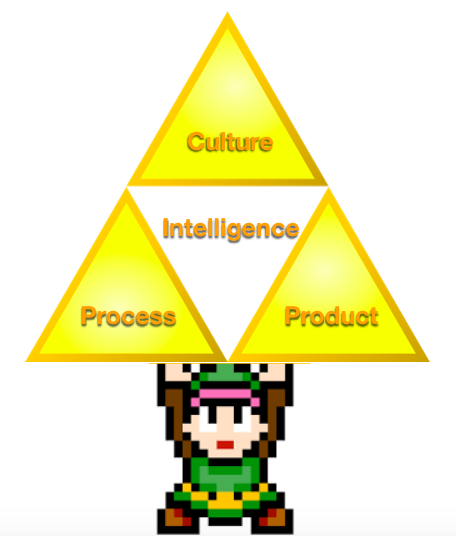One of the best visualisations of intelligence management I was exposed to during my MSc at Mercyhurst University was the concept of intelligence as three distinct powers; process, product and culture. When arranged in a diagram, as below, form the foundation for proper intelligence (yes, it looks like a tri-force from Legend of Zelda and that is an apt description).

Instead of focusing on the product exclusively, the intelligence tri-force image equally balances the process of making decisions, the product design itself and finally, how we as analysts influence organisational culture for the better.
If you imagine any of these lacking you can see where problems start; Bad process results in poor data or requirements, inadequate products fall into the “so what?” or “nice, but doesn’t answer my question” category, and culture questions if a given organisation is ready to accept and learn from intelligence-led principles.
The traditional intelligence cycle emphasis a circular process of requirements to dissemination but the strategic level of detail can be lost. This represents a disconnect between analysts and decison-makers. I have seen many businesses pay lip service to intelligence without the necessary resources to succeed. Couple this with the drive for intelligence performance management which asks, “what have you done?” makes doing your best difficult.
There is to much to cover on each piece in this post so I will do a separate bit on each piece of the “tri-force” starting in the deep-end; Culture.
Working in risk intelligence function our team was asked how we measure our impact. I wanted to respond with the Futurama quote by the God Entity whom Bender encounters in deep space; “When you do things right, people won’t be sure you’ve done anything at all.”

Intelligence is a support function akin to an advisory role. I feel if your organisation asks you to quantify intelligence impact, you likely have a culture problem. The response back could be, “what have you done with my analysis?” But as analysts we are a sounding board, a patient, objective instrument of our decision-makers. So we don’t lash out, we educate.
Where do we start on fixing culture? It sounds like a catch twenty-two, I can’t demonstrate impact but I need to change minds though applied work? My main piece of advice is to make friends! Sit with decision-makers or teams you rely on (like IT) and genuinely get to know them. Its always harder for a friend to not listen to you and easier for you to challenge them on a bad decision. This does require good inter-personal skills.
Any other good way to win hearts and minds is over deliver. Now that may mean some longer nights, and doesn’t mean purposefully under scoping! It means when you have your requirements, whether you are 100% on board or not, deliver the product as best you can bit push the analysis further. We are getting into product talk here, but an extra graph or novel visualisation can really excite a decision-maker, show enthusiasm and building trust.
What if the decision-maker is difficult? Sometimes a decision-maker doesn’t want your involvement. Internal politics, work silo’s and many other factions many mean your best analysis is still pushing up hill. I once saw a consultant hired to do six months worth of work only to be told they were not welcome four months in and their report would likely be ignored. Wow, way to build relationships! Sometimes these things just happen, and it means the business is either not ready for your skill set or cannot figure out their own culture (but sometimes it can be that you’re not doing great yourself). You still stick to the same formula, make friends, understand their needs and deliver practical improvement.
A bit harsher solution is to bring in outside help! Organisations don’t want to be seen trailing behind competitors or comparable organisations. So what are they doing? Do they have an effective intelligence unit? Ring the alarm bells in your organisation. Sometimes the fear of being left behind can spur action and open doors. Competitive analysis, even in a basic level can demonstrate industry movement, or if you are in a collaborative field, call a colleague in another organisation and find out how they do it. It will not only be cathartic as you share frustrations on your journey to intelligence, but can yield lots of examples why intelligence is necessary and working else where.
Fixing culture is a mammoth task. So much so an industry around ‘business transformation’ has formed. You won’t change opinions of over night and you may take some bruises getting embedded. Keep your chin up, maintain your trade-craft integrity, do good work, all will come right.
